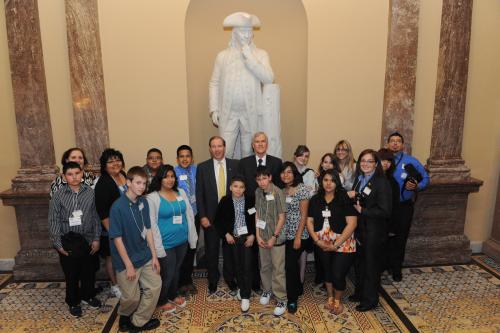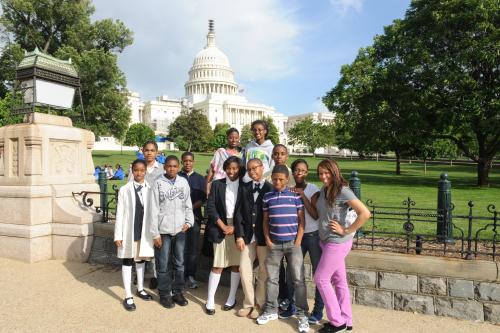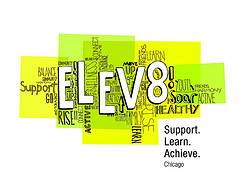Elev8 Youth Speak for Themselves on Capitol Hill
Resource type: News
On April 22, students from 20 Elev8 middle schools across the country filed into legislative office buildings surrounding the nation’s capitol, nervous but prepared to speak out on issues they had selected themselves, including school safety and funding for afterschool programs.
The visit to Capitol Hill was part of a national Elev8 youth conference intended to build on what students had learned through their local Elev8 programs. Developing students as leaders through community service projects and political advocacy training is a cornerstone of Elev8. Prior to the national trip, many students had already met with state and local legislators.
 Middle school is a crucial time for teaching students how to assert themselves in a productive way, said Brenan Smith-Evans, associate director of Chicago’s Mikva Challenge, a youth development organization that helped lead the April conference. “Bullying and refusing to engage in class work are unhealthy ways kids seek power,” she noted. Through Elev8 afterschool leadership programs, students learn how to identify problems in their schools and communities, develop solutions and communicate them effectively. But unlike “mock Congress” activities more common for this age group, Smith-Evans said, “Getting to meet with elected officials in Washington, D.C., is real power. It’s authentic civic engagement.”
Middle school is a crucial time for teaching students how to assert themselves in a productive way, said Brenan Smith-Evans, associate director of Chicago’s Mikva Challenge, a youth development organization that helped lead the April conference. “Bullying and refusing to engage in class work are unhealthy ways kids seek power,” she noted. Through Elev8 afterschool leadership programs, students learn how to identify problems in their schools and communities, develop solutions and communicate them effectively. But unlike “mock Congress” activities more common for this age group, Smith-Evans said, “Getting to meet with elected officials in Washington, D.C., is real power. It’s authentic civic engagement.”
During the three-day conference, Mikva led activities to get kids thinking of themselves as leaders and problem-solvers. Students worked together to write descriptions of their ideal city. They watched and reflected on a documentary about the Children’s Crusade in Birmingham, Ala., in 1963, where thousands of children were jailed for marching to end segregation in their city.
“They fought for what they believed in, and they got what they wanted,” said Aliyah Young, an 8th grader from Baltimore, who hadn’t known that kids her age took part in the civil rights movement. “I realized that students can have a voice.”
The trip to Washington, D.C., also included visits to colleges, museums and a moonlight tour of national monuments. But the visit to Capitol Hill on Tuesday was the main event.
Meeting with Senators
Mid-afternoon, in a marble foyer deep inside the U.S. Capitol building, 10 students from New Mexico gathered around one of their senators, Jeff Bingaman, who had just stepped off the Senate floor to greet them. Richard Arkie, an 8th grader with a blue tie and a statesman-like bearing, delivered a greeting in Keresan, the language of the Laguna people. Quickly translating, he introduced himself and thanked the senator for his service to the State of New Mexico, on behalf of the group, Laguna Pueblo and the Governor of Laguna. (Gov. Richard Luarkie had stopped by Laguna Middle School to help students prepare for their visit to Capitol Hill, and sent his official greeting.)
Richard explained that they had come to talk about the value of afterschool programs, school-based health centers and family supports, all services provided through Elev8.
Bingaman was soon joined by Sen. Tom Udall of New Mexico, who stood beside him under the towering statue of Benjamin Franklin.
In the weeks leading up to their Capitol Hill visit, the students from New Mexico had read biographies of each of the legislators they intended to visit. Discovering that Bingaman served on the Senate committee overseeing health and education and that Udall served on one concerned with Indian education and health, they decided to focus on those topics. A two-hour training earlier in the day with Mikva Challenge staff helped them polish their presentations.
 A quiet but confident girl spoke next. She told the senators that at one time she had considered suicide. “With the help of our school-based health center, I was able to get better,” she explained.
A quiet but confident girl spoke next. She told the senators that at one time she had considered suicide. “With the help of our school-based health center, I was able to get better,” she explained.
The girl mentioned later that her advocacy training back in New Mexico had taught her “to give a specific example of things you’ve done and why you need that program.” Her story seemed to make an impression on Udall, who called it “an example of why it’s important to have school-based health.”
Next, Brenda Cardenas, an 8th grader from a school near the Mexican border, described an Elev8 afterschool program called Microsociety, where students take on adult roles in banking, business and government. She’s the mayor of her school’s Microsociety, she added, drawing a smile from Bingaman.
Cristain Reyes, a 7th grader whose family immigrated to Albuquerque from Mexico, spoke in Spanish about the Elev8 family supports available at his school, with Brenda translating. Through Elev8, his mother joined a school advisory council that Elev8 organized to help Spanish-speaking parents to voice their concerns.
Jonathan Brown, an 8th grader, asked the senators if there would be money coming from Congress to support afterschool programs and school-based health centers. “I think there will be,” Bingaman told him. “They’ll be an argument about how much.”
At the end of the afternoon, the New Mexico students expressed surprise at the warm reception they’d received. Their Capitol Hill visit had also included meetings with the New Mexico governor’s D.C. office director, two representatives and a couple of legislative aides.
“It was pretty shocking they actually listened to us,” said Richard. “I didn’t get to tell them a lot, but it felt good to tell them what I did, and in my own language. It felt good to have them listen to my peers about our issues.”
Gaining Confidence
Kids from all four Elev8 sites reported that their Capitol Hill experience helped them gain confidence. Howard Walker, an 8th grader from Oakland, Calif., said he felt shy during practice, but began to relax as he talked to congressional staff about the need to increase funding for afterschool programs. “After I talked to them, I felt like they were just regular people,” he said.
“They were impressed,” reported Teddy Rosemond, a 7th grader from Baltimore, describing the reaction after his group made a case for increased school funding by describing classroom conditions, including a textbook shortage. “They were saying, ‘I’m proud of you guys coming here and doing this.'”
Cynthia Rodriguez, an 8th grader from Chicago, thinks the advocacy skills that she learned through Elev8 will help in her future career. “I’ll know how to make presentations and be professional,” she said.
Earlier in the day, Cynthia had made a case for funding youth civic engagement programs to the U.S. Department of Education. The Chicago group had been invited to a “listening session” with 10 staff members who wanted to hear directly from students about what influences their school success. Kids talked about the importance of teacher quality, school-based health centers, neighborhood safety, afterschool programs and more.
The staffers paid attention. “I noticed they were listening to us, taking notes, so I felt kind of special,” said Gustavo Garcia, a 7th grader from Chicago. “Our voice counts.”
To Learn More about Elev8:
> Visit our Elev8 page for videos and updates
> Visit www.elev8kids.org or the websites of the local initiatives:
Elev8 Baltimore
Elev8 Chicago
Elev8 New Mexico
Elev8 Oakland
Elev8 is a grantee of Atlantic’s Children & Youth programme in the United States, which funds efforts to support and expand community schools.
